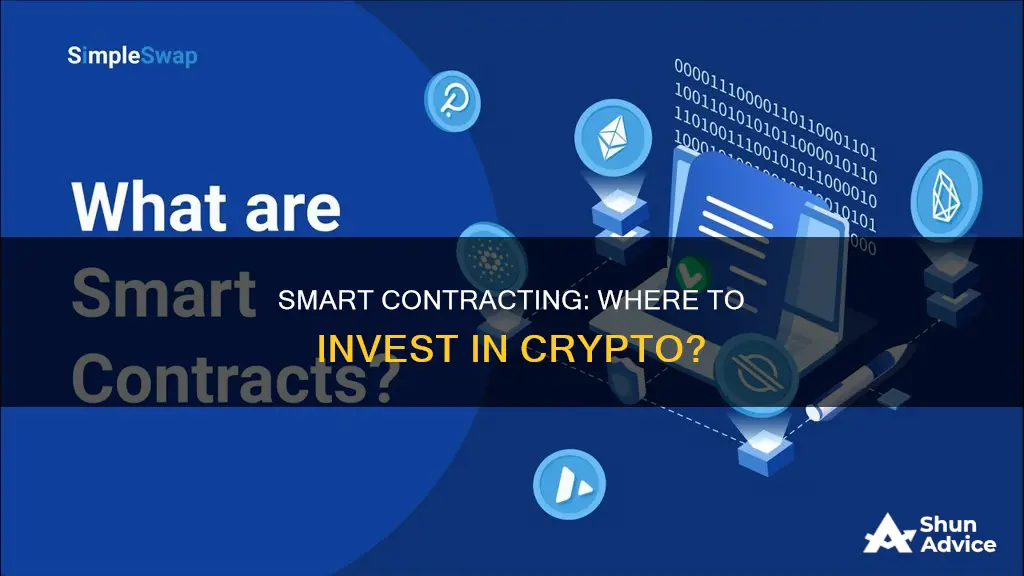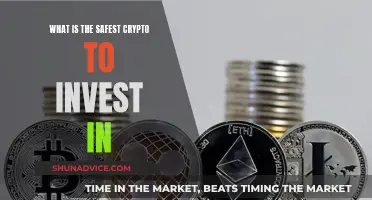
Smart contracts are a key feature of cryptocurrencies, providing a secure and automated way to facilitate agreements and transactions without the need for intermediaries. This technology has the potential to revolutionize various industries, including finance, supply chain management, and real estate, by increasing efficiency, transparency, and security.
The most well-known platform for smart contracts is Ethereum, which utilizes its own programming language, Solidity, to create complex applications. Other notable smart contract platforms include Binance, Cardano, Solana, and Chainlink, each offering unique features and advantages.
Investing in smart contract platforms offers an exciting opportunity, as these digital currencies have the potential to survive long-term and perform well. However, it is important to carefully consider the risks, such as regulatory changes and technological advancements, before making any investment decisions.
| Characteristics | Values |
|---|---|
| Purpose | To settle a transaction once a verifiable event, such as a payment, has taken place |
| Function | To facilitate, verify, or enforce the terms of an agreement without the need for a third party |
| Use cases | NFTs, decentralized exchanges, stablecoins, supply chain, real estate, healthcare, insurance, gaming |
| Benefits | Speed, efficiency, accuracy, trust, transparency, security, cost reduction |
| Limitations | Immutability, the need for accurate coding, security loopholes, reliance on programmer expertise |
| Platforms | Ethereum, Binance, Cardano, Solana, Avalanche, Chainlink, Bitcoin SV |
What You'll Learn
- Ethereum, the first cryptocurrency to launch smart contract functionality
- Binance's BNB Chain, a smart contract platform compatible with Ethereum
- Cardano, Solana, Avalanche and Chainlink, highly valued smart contract-enabled networks
- Smart contract supply chain implications, e.g. IBM’s Food Trust
- Smart contracts in real estate, e.g. Propy

Ethereum, the first cryptocurrency to launch smart contract functionality
Ethereum is a community-run technology that powers the cryptocurrency ether (ETH) and thousands of decentralised applications. It is a public blockchain platform that allows users to create and execute smart contracts.
Ethereum was the first cryptocurrency to launch smart contract functionality. As a result, it powers most decentralised finance (DeFi) applications. According to State of the dApps, about 80% of DeFi applications run on Ethereum's network.
Smart contracts are self-executing digital agreements that enable two or more parties to exchange money, property, shares, or anything of value in a transparent, conflict-free way while avoiding the need for a third party. They are commonly associated with cryptocurrencies and are considered a fundamental building block for DeFi and non-fungible token (NFT) applications.
Smart contracts are a type of Ethereum account with a balance that can be the target of transactions. They are deployed to the network and run as programmed. User accounts can interact with a smart contract by submitting transactions that execute a defined function. Smart contracts can define rules and automatically enforce them via code. They cannot be deleted by default, and interactions with them are irreversible.
Anyone can write a smart contract and deploy it to the network. To do so, one must learn how to code in a smart contract language and have enough ether to deploy the contract. Deploying a smart contract is technically a transaction, so one must pay gas in the same way one would for a simple ether transfer. However, gas costs for contract deployment are far higher.
Ethereum has developer-friendly languages for writing smart contracts, such as Solidity, a Turing-complete programming language. These languages must be compiled before they can be deployed so that Ethereum's virtual machine can interpret and store the contract.
H1B Holders: Where to Invest in Bitcoin?
You may want to see also

Binance's BNB Chain, a smart contract platform compatible with Ethereum
Binance's BNB Chain: A Smart Contract Platform Compatible with Ethereum
The BNB Chain, formerly known as the Binance Smart Chain, is a smart contract platform that is compatible with the Ethereum Virtual Machine (EVM). It is a Layer 1 blockchain within the broader BNB Chain ecosystem, developed with the support of the Binance cryptocurrency exchange. The BNB Chain is designed to be fast, secure, and efficient, offering low transaction costs and fast finality.
Key Features of the BNB Chain
- EVM Compatibility: The BNB Chain is fully compatible with the EVM, allowing for easy portability of smart contracts and decentralized applications (dApps) from the Ethereum network. This compatibility also grants access to the extensive Ethereum tools and dApps ecosystem.
- Fast Finality: The BNB Chain achieves fast finality, confirming the immutability of transactions within a short time. In most cases, the chain finalizes within two blocks, and transaction finality can be confirmed in around 6 seconds.
- Low Transaction Costs: The BNB Chain is known for its low transaction fees, making it an attractive alternative to the Ethereum network, which has been criticized for high gas fees.
- Decentralized Governance: The BNB Chain employs a Proof of Staked Authority (PoSA) consensus mechanism, which encourages community participation and decentralization. Token holders can stake their tokens and delegate them to validator candidates. Validators are responsible for block production and are subject to "slashing" as a punishment for any malicious behavior.
- Interoperability: The BNB Chain features efficient native dual-chain communication, making it optimized for scaling high-performance dApps that require a smooth user experience.
- Validator Sets: The BNB Chain relies on a system of 55 validators, with a combination of Delegated Proof of Stake (DPoS) and Proof of Authority (PoA) for consensus. This setup enables short block times and lower fees.
Smart Contract Functionality
The BNB Chain, through its BNB Smart Chain component, is equipped with smart contract functionality. This enables the development of various decentralized applications, leveraging the benefits of the BNB Chain ecosystem. Smart contracts on the BNB Chain can be created and deployed using platforms like thirdweb, which offers an intuitive dashboard for contract creation and deployment.
Binance's BNB Chain, with its smart contract capabilities and Ethereum compatibility, presents an attractive platform for developers and investors alike. The combination of low fees, fast transaction times, and interoperability makes it a compelling choice for building and deploying decentralized applications. With the support of the Binance exchange, the BNB Chain ecosystem continues to grow, offering a robust and secure environment for smart contract execution.
Royal Mint Coins: Worthy Investment or Costly Mistake?
You may want to see also

Cardano, Solana, Avalanche and Chainlink, highly valued smart contract-enabled networks
Cardano, Solana, Avalanche and Chainlink are highly valued smart contract-enabled networks. Each of these networks has unique features and capabilities that make them attractive for investors and users.
Cardano
Cardano, developed by IOHK, takes a research-driven approach to blockchain development, emphasising peer-reviewed academic research in its design. It utilises the Ouroboros Proof-of-Stake consensus protocol, which allows for scalability through layered architecture. Cardano's methodical approach to development has garnered attention from investors looking for a platform with a strong theoretical foundation and potential for long-term growth.
Solana
Solana is known for its high throughput and low costs. It has attracted high-frequency trading and DeFi projects. Despite facing some regulatory challenges and volatility, Solana has demonstrated resilience and growth potential, making it an intriguing prospect for investors.
Avalanche
Avalanche provides a platform for launching highly scalable and customisable blockchain networks and decentralised applications. It offers a unique consensus protocol combining classical and Nakamoto consensus, along with support for multiple virtual machines, including the Ethereum Virtual Machine (EVM). Avalanche's innovative approach to consensus and its compatibility with Ethereum applications have positioned it as a strong competitor in the smart contract platform space.
Chainlink
Chainlink is the most widely used decentralised oracle network, securing tens of billions of USD value across numerous blockchains and use cases. It provides smart contracts with access to off-chain data and events, such as decentralised price feeds, verifiable random functions, and cross-chain interoperability. Chainlink's decentralised oracle networks serve as a bridge between smart contracts and the outside world, enhancing their functionality and security.
Coin Stock: Worth the Investment Risk?
You may want to see also

Smart contract supply chain implications, e.g. IBM’s Food Trust
Smart contracts have a wide range of applications in supply chain management, and one of the most prominent examples is IBM's Food Trust platform. This platform leverages blockchain technology to enhance transparency, security, and efficiency in the food supply chain. Here are some implications and benefits of smart contracts in this context:
- Improved Traceability and Transparency: Blockchain technology enables end-to-end traceability of food products, allowing for the tracking of their journey from farm to fork. This enhances transparency by providing real-time data on the provenance, location, and status of food items. For instance, Walmart, in collaboration with IBM, reduced the time required to trace the provenance of mangoes from 7 days to just 2.2 seconds.
- Enhanced Food Safety: Smart contracts improve food safety by providing transparent and traceable records of a product's journey. By recording information such as ingredient origins, production processes, and transportation conditions on the blockchain, consumers can have greater confidence in the safety and quality of their food. This also helps in quickly identifying the source of foodborne illnesses, enabling companies to act faster and protect consumers.
- Quality Control: Smart contracts facilitate quality control by allowing companies to record relevant data such as temperature, humidity, and handling conditions at each stage of the supply chain. This enables the quick identification and removal of defective items, improving customer satisfaction and reducing the risk of product recalls.
- Inventory Management: Blockchain technology improves inventory management by providing real-time visibility into inventory levels and movements. This helps optimize inventory levels, reduce stockouts, and avoid overstocking, leading to cost savings and improved efficiency.
- Product Authentication: Counterfeiting is a significant issue in the food industry, and blockchain helps address this. By recording the origin and movement of products on a tamper-proof blockchain, it becomes much harder for counterfeit goods to enter the supply chain. Consumers can also verify the authenticity of products by scanning QR codes or accessing blockchain records.
- Streamlined Processes: Smart contracts automate and streamline supply chain processes. For example, payments can be automatically triggered upon delivery of goods or completion of quality checks, reducing manual intervention and minimizing human errors.
- Improved Collaboration: Platforms like IBM Food Trust enhance collaboration among various participants in the food supply chain, including growers, processors, wholesalers, distributors, manufacturers, and retailers. This collaborative network improves visibility and accountability, enabling better decision-making and a more efficient food ecosystem.
- Sustainable Sourcing: The transparency provided by blockchain enables consumers to make informed choices about the food they consume, supporting the growth of sustainable practices in the industry. This creates a more responsible and environmentally friendly supply chain, benefiting both consumers and the planet.
- Data Security and Ownership: IBM Food Trust utilizes a permissioned blockchain network, ensuring data security and controlled sharing of information. Participants retain complete control over their data, deciding what information is shared and with whom. This fosters trust and maintains data privacy.
- Reduced Food Waste: Smart contracts help reduce food waste by improving visibility into the food supply chain. With better tracking and traceability, companies can minimize waste hotspots and optimize the management of perishable items, reducing the amount of food that ends up in landfills.
Coinbase Investment Strategies: Best Options for Your Portfolio
You may want to see also

Smart contracts in real estate, e.g. Propy
Smart contracts are becoming increasingly popular in the real estate industry, offering a range of benefits such as speed, efficiency, security, cost savings, and transparency. These automated contracts, based on blockchain technology, streamline the buying and selling process, making it more secure and transparent. One notable example of smart contracts in real estate is Propy, a real estate platform that simplifies property transactions.
Propy leverages blockchain technology and smart contracts to streamline the entire property-buying process. Founded in 2016, Propy has raised over $2.7 million in funding. The platform enables buyers and sellers to connect, negotiate terms, and complete transactions online using smart contracts. It also allows owners and brokers to list properties, search for potential buyers, and negotiate sales. The Propy platform processes all the necessary paperwork, wire payments, and e-recording, ensuring a secure and seamless experience.
One of the key advantages of using Propy is the elimination of intermediaries. By cutting out middlemen such as lawyers, brokers, and other individuals, Propy reduces the costs and time associated with real estate transactions. The platform also enhances transparency and trust, as all transactions are stored on the blockchain, making it impossible to tamper with the data.
Another benefit of Propy is its ability to handle international property transactions. The app facilitates collaboration between sellers and buyers, regardless of their location. It also provides a program for realtors to become "Crypto Certified", giving them an edge in the local market. Propy has processed $4 billion in transactions for consumers and agents, showcasing its success in the real estate industry.
In addition to Propy, there are other companies utilizing smart contracts in real estate, such as SMARTRealty, which facilitates peer-to-peer transactions, and Rent Peacefully, which allows for renting and listing properties on the blockchain. These companies are revolutionizing the industry by providing efficient, secure, and transparent solutions for property transactions.
Nav Coin: A Smart Investment Decision?
You may want to see also
Frequently asked questions
Smart contracts can cut costs, speed up processes, and reduce human error. They are also more secure than traditional contracts, as they are stored on a blockchain, which is transparent and immutable.
Smart contracts cannot be easily changed once they are deployed on the blockchain. This means that any mistakes in the contract code are permanent and can be costly to fix. Smart contracts are also vulnerable to security loopholes, which, if exploited, could lead to significant financial losses.
Ethereum was the first cryptocurrency to launch smart contract functionality and remains the most popular blockchain for running smart contracts. Other popular options include Cardano, Solana, Polkadot, and Chainlink.







